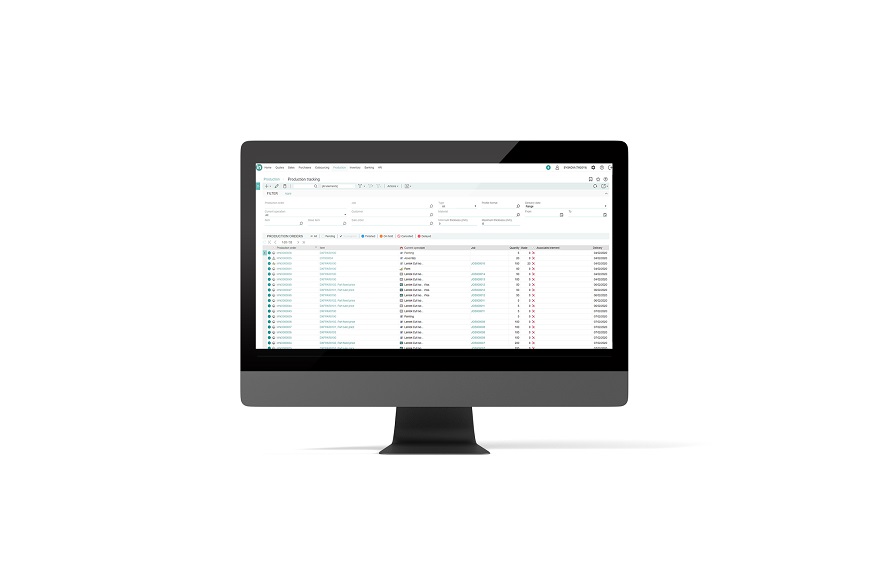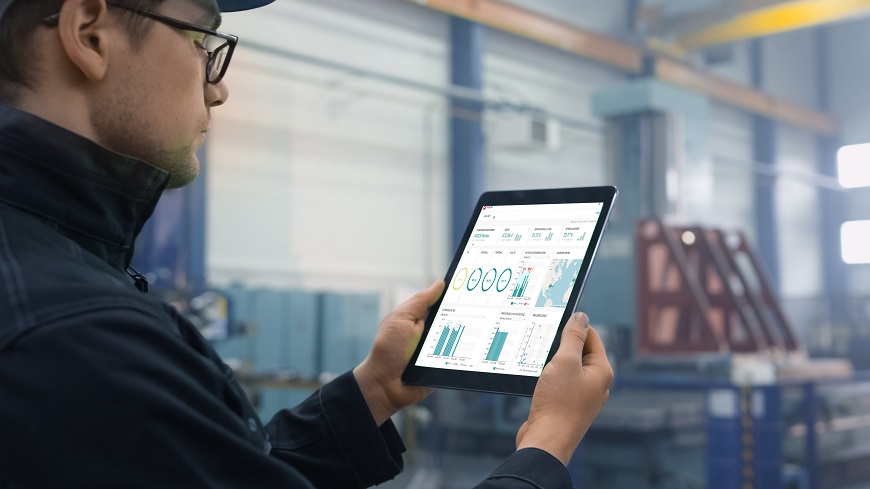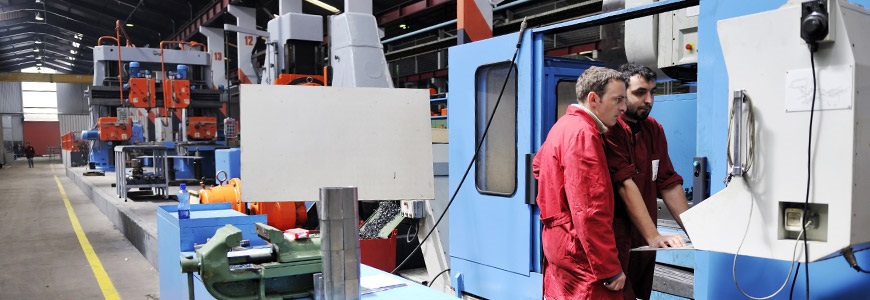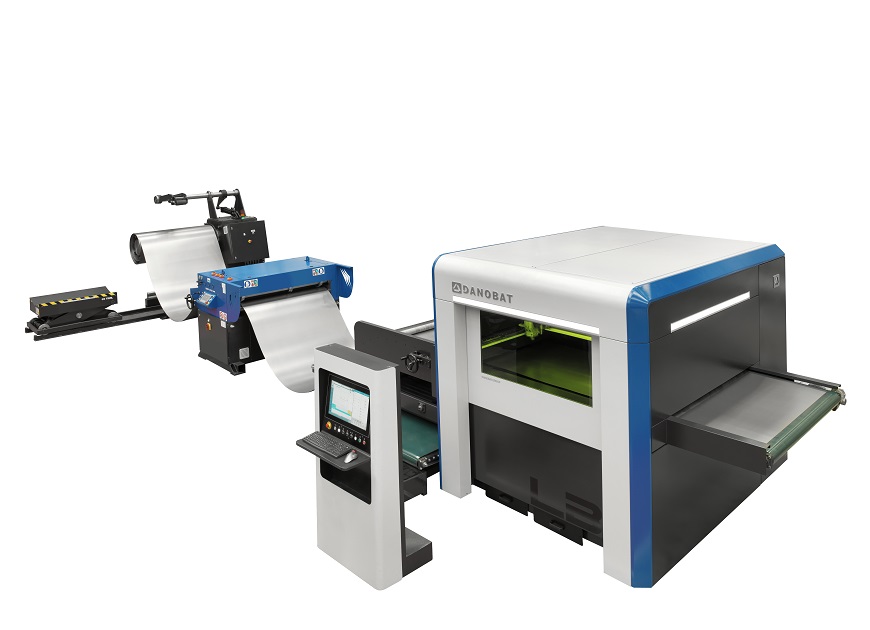
Ideally, plants should have standardized environments that are connected to machines and processes. But how to standardize sheet metal factory management and planning? The answer arrived years ago in the form of technology with the name enterprise resource planning software, or ERP. Thanks to these universal, albeit not sector-specific, tools, organizations were able to integrate all of their business areas (finance, sales, services, projects, manufacturing, and many more), obtaining analyses from key business parameters and an overview of everything going on at the company.
Thus, it then became possible to analyze productivity, responding to the needs of growth, optimization, and business process profitability, and, in the case of companies in the sheet metal industry, being able to manage machine capacity vis-à-vis production to adapt to market demands. All of this was able to be done in a coordinated fashion through an ERP, allowing the business to always be under control.
However, each industrial business sector is a world unto itself, and companies even more so. Implementing an ERP platform that adapts to each company’s needs can sometimes be complicated, even more so when focusing on the sheet metal industry, where the need for rigorous advance planning and part production customization are the maxims of all modern manufacturers.
The market offers a wide range of solutions. So, finding the ERP best suited to the company and industry can be a particularly arduous task. That’s why considering a few key questions can help immensely when choosing the best management software. In this article, we propose 10 key questions that will help you make a decision:
1. Does my company need a standard solution or a niche solution, why?
There is a wide variety available on the market, but in a sector as vertical and specialized as sheet metal cutting, the most appropriate thing to do is opt for a niche solution, i.e., a management software designed for and by sheet metal industry companies. The reasons are clear, given that it is difficult to find a solution adapted to the sheet metalworking industry that covers all of the management areas and also covers the entire sheet metal production process from quoting to billing and product delivery.
In short, having a niche enterprise resource planning system that adapts to the needs of companies in the industry will offer ad hoc solutions for industry-specific problems, providing higher performance compared to a generic ERP package.
2. Can I use an open-source ERP application at the plant?
These kinds of ERP solutions require a great deal of work to customize and adapt to the sector at hand. Therefore, the success of the implementation of open-source software depends largely on the work of the consultant and their knowledge of the business.
Despite all of this, in the sheet metal industry, there are areas that will be difficult to manage efficiently with a generic ERP, as is the case with managing the manufacture of nested parts and quoting, which ultimately require integration with the manufacturing CAD/CAM.
Not all CAD/CAM programming systems have this feature, although, through different modules (Masterlink / Lantek MES [Powersync]), Lantek Expert does allow for the input and return of data for companies with open-source ERPs.
3. Should I have the Lantek CAD/CAM installed on my cutting machines in order for the Lantek ERP to work?
Indeed. Lantek Integra, Lantek’s ERP, hinges on Lantek Expert, Lantek’s CAD/CAM, having been previously installed. This is a system into which it is fully integrated, since we start with a data history and statements generated based on said history. The software provides tools to create highly precise quotes, manage purchase and stock levels, monitor and control manufacturing processes, and provide management reports on key performance indicators.
For example, it can provide estimated time calculations for cutting, material needs, manufacturing statuses, etc.
4. What specific advantages does the Lantek ERP offer that a generic ERP does not?
In order to answer this question, consider the metaphor of buying a custom suit, in this case the Lantek solution, and buying a suit that will later be taken elsewhere to be tailored to your needs, the generic solution.
Lantek Integra is verticalized specifically for the sheet metalworking industry, i.e., it is a software platform for advanced manufacturing management at companies that produce parts made of sheet metal, tubes, and metal profiles. A custom ERP designed specifically for this industry entails the following:
5. Which areas of the company will benefit from incorporating such a software and what does the ERP offer?
CRM: for bid monitoring and creation. First, the sales area will benefit from a quoting tool adapted to the business, which will allow the company to increase the number of bids.
Sales: going from the bid to manufacturing is truly simple. The effort involved in the initial quoting phase is leveraged throughout the rest of the sales cycle. It will also allow for the status and phase of each of the components or items in the order to be easily checked at all times
Manufacturing: Lantek MES allows manufacturing processes and resources to be optimized, offering a global vision of what is going on in the workshop and allowing all the different activities occurring in the production plant to be monitored in real time.
Workshop: the workshop will also benefit from a tool that digitalizes manufacturing orders and improves the flow of information between different operations.
After-sales: in this business, item traceability is key and allows for potential defects or manufacturing errors to be detected. Using this system, you’ll be able to provide quick and detailed information about the casts used on each item
6. What hardware do I need to be able to implement it? What modules would I need?
Lantek requires a server with a 3 GHz Intel Core i5/i7 processor or above, or a 3.3 GHz AMD Phenom II X6 or above, and 24 GB RAM. At least 170 GB of free hard drive space is also needed, but it all depends on the data to be stored.
Lantek Integra is installed on the server and can be accessed from any web environment. It operates with an SQL database and we recommend purchasing SQL Server Standard licenses. The SQL server and Lantek are usually installed on the same piece of equipment (although it depends on the environment and size of the company) so the requirement information provided includes a server to allow space for everything.
7. Is the quoting module key for choosing the Lantek ERP over other solutions?
The quoting module is key, even more so in the sheet metal industry, where it is difficult to analyze all of the costs involved. In fact, it is in quoting where the most effort is usually dedicated to defining the operations of manufacturing, cleaning up drawings, quoting materials, estimating times, optimizing nesting, etc.
A tool that allows this process to be done quickly will significantly increase the number of bids, and therefore the probability of successful sales. If on top of this, you add in the fact that all of this effort can be carried over to the subsequent sales and manufacturing cycles, Lantek undoubtedly has a significant competitive advantage over any other generic ERP.
8. The ERP records manufacturing operations. Does it guarantee product traceability throughout the process?
Yes, the Lantek ERP guarantees product traceability throughout the manufacturing process and also helps users to meet the requirements of their customers’ delivery schedules. Thanks to the tools provided by the Lantek ERP, plant processes can be understood and analyzed at any point in the manufacturing process: where the individual piece is, the time dedicated, and the number of employees that have participated in the manufacturing process. Similarly, lost or defective quantities can be recorded to be able to respond quickly to any eventuality or potential cutting errors.
In short, all of this contributes to guaranteeing the efficiency and profitability of each job in a system that is easy to use and requires little customization.
9. Does the ERP include after-sales service and maintenance?
All implementation types have a warranty period of three months. However, it should be noted that when it comes to Solutions, like the ERP, maintenance is not included. This must be purchased ad hoc, i.e., when the product is purchased, a maintenance contract must be signed. This contract includes after-sales service.
We believe that offering maintenance and support services to our customers is fundamental. Lantek accordingly puts metal companies in touch with the professionals responsible for analyzing the characteristics of each company, implementing the software systems, and configuring them so that the companies have a fully integrated, dynamic, flexible, and efficient tool. These professionals also provide support to these companies and accompany them throughout the process of training personnel and answering subsequent questions so that the company can make the most of its ERP.
After the launch, verification, and closure of the implementation project, the maintenance service begins, provided it was previously purchased with the ERP solution. It includes access to the support service and annual program updates, among other things.
10. Which metrics and analytics can be consulted on the ERP?
The data that customers can find differ based on what they’d like to emphasize for the analysis. For example, a company experiencing production errors may want to have metrics to be able to analyze and determine in which process(es) these errors are occurring and their causes so as to be able to make the most appropriate decisions and attempt to mitigate errors, as these production errors may be due to defective equipment or a lack of maintenance, lack of personnel training, defects in the raw materials, etc.
Therefore, data analysis is key and can be visualized with views and reports. The Lantek Integra ERP offers standard information, although it does have advanced options that include the possibility of customization based on the customer’s needs.
In an environment increasingly led by the need for digitization and in which companies in the metal industry are more and more aware of the need to digitize, choosing the right ERP and MES for that process is even more vital.
Nowadays, customers are increasingly seeking out integrated solutions that allow them to be more competitive in their industries, optimizing their manufacturing and business processes and making them more efficient.
Lantek’s deep understanding of the sheet metal industry and years of experience working within it have allowed it to adapt its solutions to the specific challenges of the sector and its companies to satisfy their needs with a platform that is easy to use and implement. In the current economic climate, the ability to create a precise quote that includes all real manufacturing costs as well as improvements to administration and the presentation of reports and manufacturing management can lead to a significant competitive advantage. Undoubtedly, this is just another step in the digital transformation process in which the metal and sheet metal industry is already immersed.


